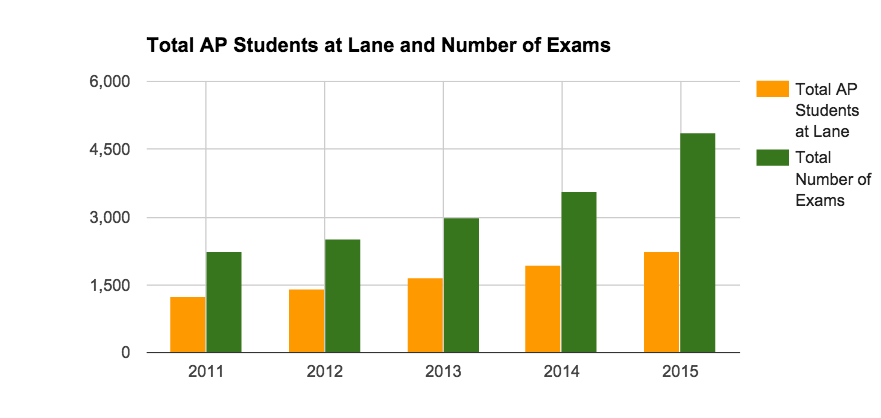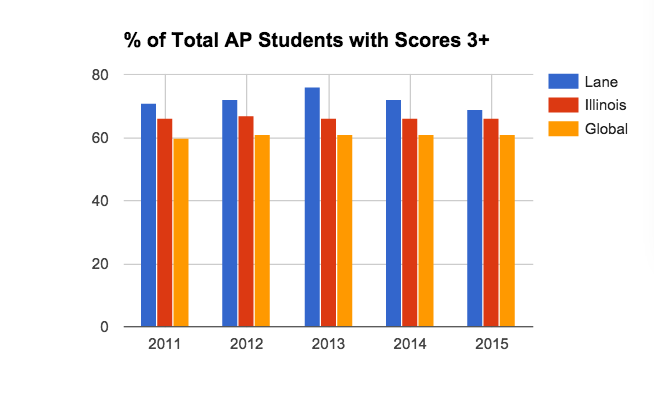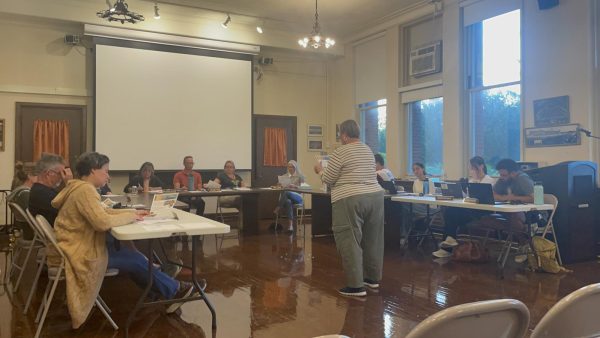AP participation up, scores down
AP Classes are many things: stressful, challenging, filled with homework. As early as freshman year, students are able to take AP Human Geography, which some say helps them get a jump start on how an AP class works.
It is reasonable to assume that students taking an AP class have the intention of passing that class, but a recent article in the Chicago Tribune about AP passing rates in Illinois has showed that fewer students have been passing their tests.
Lane’s 2015 AP score passing rates for Lane were the lowest they had been in five years. Only 57.1 percent of Lane students passed their exams in the 2014-2015 school year. Although this percentage was lower than usual, it was still much higher than the average for all CPS high schools, which achieved a 38 percent overall passing rate.
Trevor Packer, the head of the AP Program at The College Board, a nonprofit organization based in New York, told the Chicago Tribune that he was not concerned with the score drop in the nationwide passing rate.
“Even students who get a score below 3 can still benefit from AP by attending a rigorous class,” Packer said.
He additionally noted that benefits such as “becoming familiar with a college-level syllabus or experiencing intensive reading” could help students to improve their skills.
Four years ago, Lane administered a total of 2,217 AP exams, according to the Chicago Tribune. In the 2014-2015 school year, 4,874 AP exams were given at Lane, more than double the number.
This November, CPS announced that over 20,700 students took at least one Advanced Placement (AP) exam in the 2014-2015 school year, which was an increase of more than 4 percent from the previous year.
Although there were more tests taken, the drop in test scores was something that was seen not only at Lane, but at schools across the country.
This trend is not uncommon: “When you have more tests that’s what happens,” Ms. Hildebrandt, the assistant principal in charge of AP classes, said.
With the introduction of new AP classes such as AP Capstone and AP Physics I, it was questioned if the addition of these classes could cause a change in scores. But even without any previous data to compare the scores to, the mean score for AP Seminar at Lane last year was a 3.
For AP Physics I the results were a bit different.
“The average score was a 2 in AP Physics I [ 2014-2015],” Hildebrandt said. “Now did that contribute to it [the drop in AP passing rate at Lane]? There’s so many tests — I doubt it’s one test that contributed to it.”
This decrease in scores was also seen in a majority of high schools in Illinois.
Around 20,000 students in Illinois took AP US History in the 2014-2015 school year. Only about half of them passed the test, and this is one of the most popular AP classes that students take. This same downwards trend was noted with AP Literature and AP US Government and Politics.
At the same time, there were high passing rates in Illinois for both AP Spanish Language and Culture and AP Psychology. CPS also increased its overall passing rate to 38 percent, which is the highest it has been in four years.
AP classes are valuable for Lane students gain college credit and/or go more in depth into a specific topic.
To prepare for AP classes next year, students should talk to their counselor and teachers about what classes they should take. Class registration will start in late February for incoming seniors.
The recent push for freshmen to take AP Human Geography was addressed by Principal Anderson in the Chicago Tribune article as well.
“There are concerns, such as, ‘Are they mature enough to handle it?’” Principal Anderson said. “But we do put things into place to ensure students are supported, such as helping kids with study skills and organization.”
For the “School of Champions,” it might be disheartening to see that the average AP passing rate went down within the past few years. But the administration is fully confident that the scores will gradually rise as they did in years past.
“I think we were happy with the number of exams we gave,” Hildebrandt said. “Obviously we strive for everybody getting a 3 or higher, but we can learn from this data. We can learn to see what worked, what didn’t, what we can try to do differently to boost our scores, and to match you guys with the best classes for you to take to be successful.”
Your donations directly fund the Lane Tech student journalism program—covering essential costs like website hosting and technology not supported by our school or district. Your generosity empowers our student reporters to investigate, write, and publish impactful stories that matter to our school community.
This website is more than a publishing platform—it's an archive, a research tool, and a source of truth. Every dollar helps us preserve and grow this resource so future students can learn from and build on the work being done today.
Thank you for supporting the next generation of journalists at Lane Tech College Prep!




